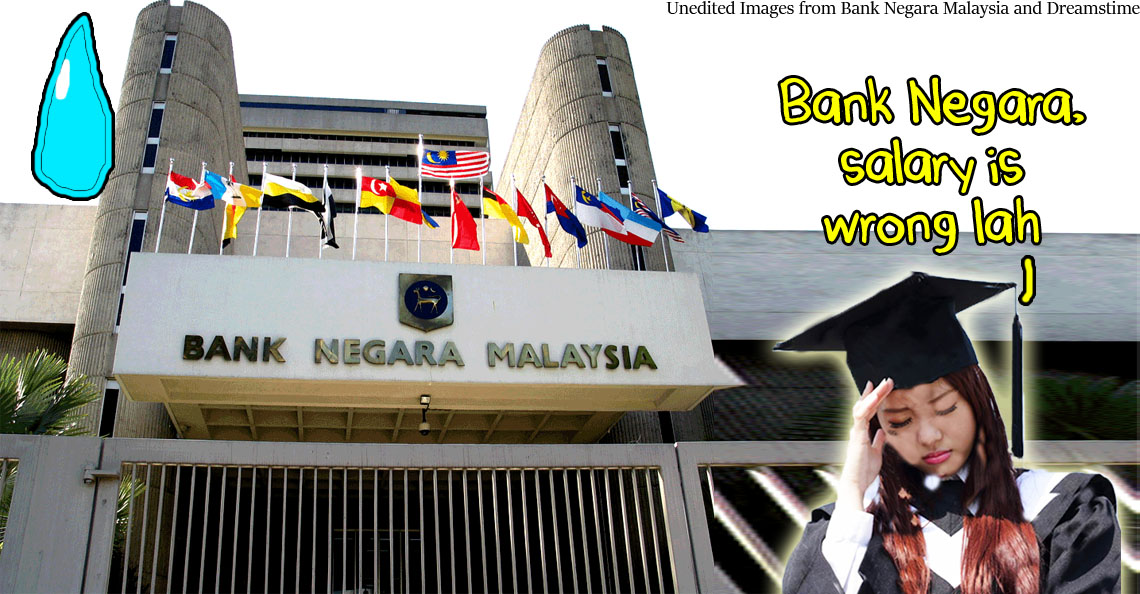Sedition Act in Malaysia vs Singapore… Which one worse?

- 292Shares
- Facebook290
- Email1
- WhatsApp1
Before we begin, some of you might be wondering… Singapore got Sedition Act wan ah?
Actually we didn’t know this as well until it was reported that 2 Singaporeans were arrested for sedition recently.
So, what happened?
The editors of a particular website known as therealsingapore.com (TRS) were arrested because of an article of theirs. The article mentions that the fights between Thaipusam devotees and policemen began when a Filipino family complained of the noise being made by a drum being used in the procession.
The police then received reports about the article being insensitive.
Upon further investigation, authorities concluded that no Filipino family was involved and arrested two of the editors for “posting remarks online that could cause ill will and hostility between different races and communities in Singapore.”
And that, ladies and gentlemen, is an example of how the sedition act is used in Singapore.
Huh? Singapore also got sedition law wan?
Yes, our neighbour also got this kind of law, and yes, they arrest people for saying stuff too.
Here in Malaysia, the sedition act is known as the Sedition Act of 1948, Act 15 of the Laws of Malaysia. On the other hand, in Singapore it is known as the Sedition Act, Chapter 290 of the Statutes of Singapore. Both were first introduced in 1948 (cos both under jajahan British that time) and both have gone through numerous changes over the years.
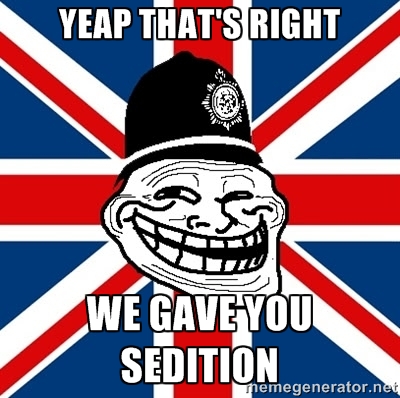
They both more or less comprise of the same points as to what constitutes sedition, except that we have one extra:
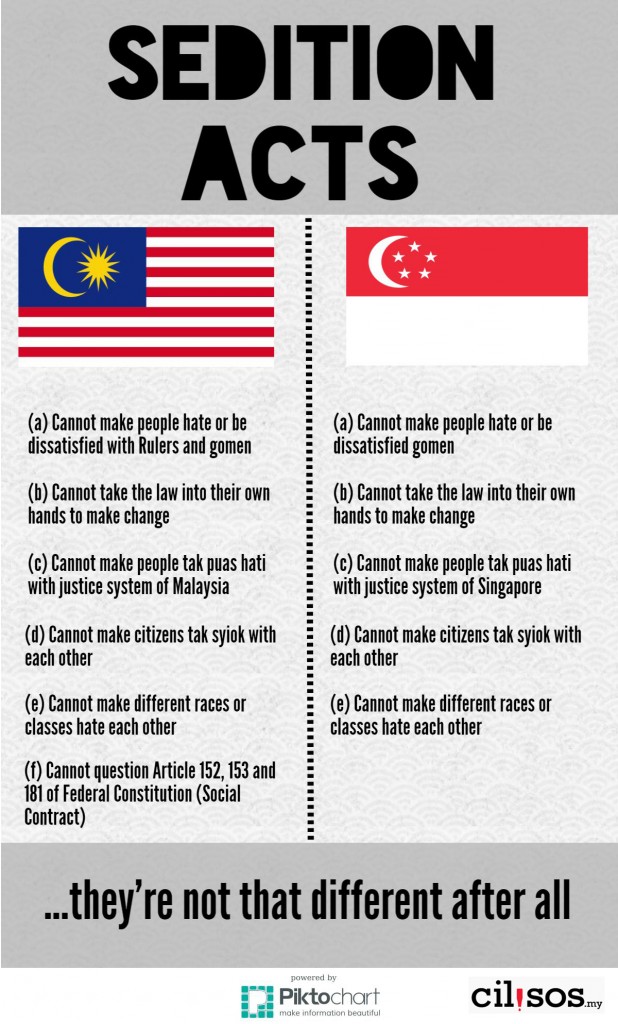
Definition taken and modified from here. For those who are unsure, article 152, 153 and 181 are in regards to the national language, special position of the Bumiputeras, and the sovereignty of the Malay Rulers, also known as the social contract.
Er…. So which one worse? Malaysia or Singapore?
Ya ya we’re getting there. The question remains though, how do these 2 acts stand when pitted against each other? Do they receive the same amount of attention? How much have they been used? And to what effect do they have on the people? Well let’s have a look using three different criterion:
1. How much are the Acts talked about?
A quick search on Google News on the terms ‘Sedition Malaysia’ and ‘Sedition Singapore’ churned out some interesting results (if anyone is wondering why Google news instead of a regular Google search, it’s because the regular Google search showed a lot of definitions and studies on it more than current topics).
Now you see when ‘Sedition Malaysia’ is looked up, pretty much most of the top news stories are Malaysian. No surprises there:
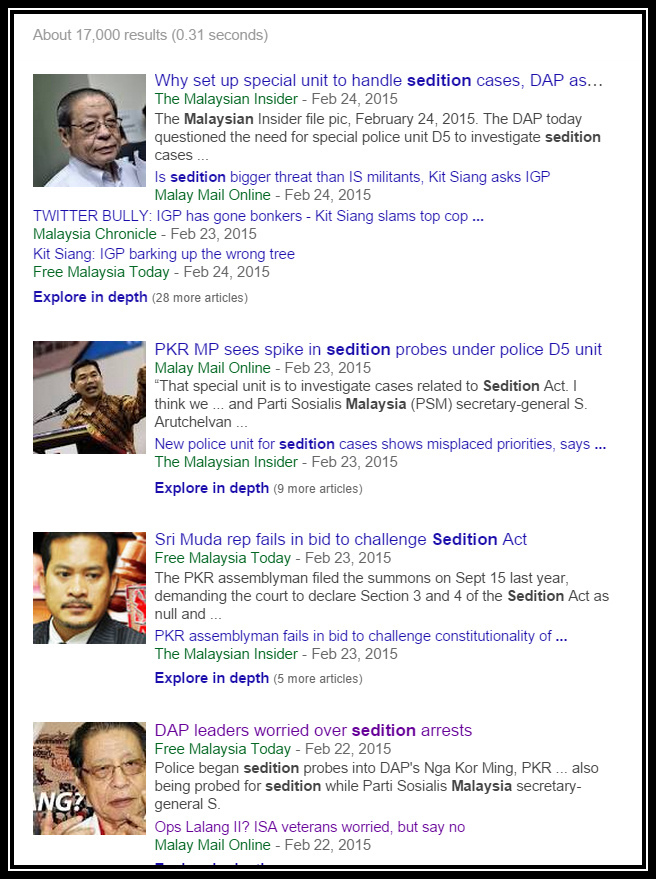
But when you look up ‘Sedition Singapore’ the top few news stories are about Singapore but after a few results, Malaysian stories start to take over (you could try this out on your own as well and see if you get the same results as we do):
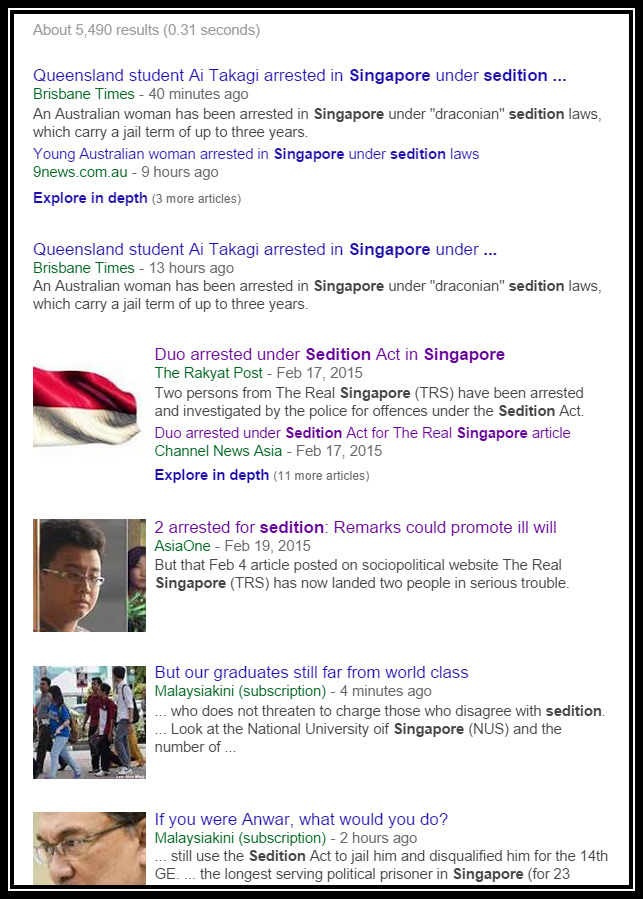
We also managed to asked an average Singaporean of what he thought of the sedition act. His response was also… quite interesting.
“I’ve never even heard of a Sedition Act in Singapore. I always thought it was the defamation act, because it’s worse to say something that is not true instead of something that is seditious but true right?” – Random Singaporean of random sex, race and hairstyle
So it seems that even though there is a Sedition Act in Singapore, it isn’t talked about as often.
Let’s check out the second criteria.
2. How often are the Acts used?
The next thing that we have to consider is how often is the Sedition Act used in the respective countries. Before we answer that question let us just clarify something that we found out when reading up on this, being arrested and being charged are two DIFFERENT things.
An arrest usually comes when there is suspicion of a criminal offence. A charge comes when there is a ‘realistic prospect of conviction’, in other words got good chance to kena from court la. So an arrest is may not necessarily lead to a charge and thus not every person arrested for sedition ends up going to court.
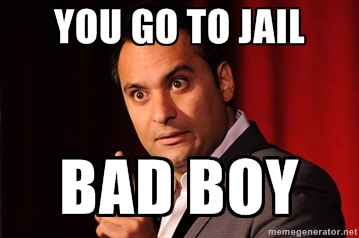
With that in mind, we tried finding statistics in regards to sedition. We apologise that we couldn’t find the total statistics for sedition arrests and charges in both Singapore and Malaysia. But what we were able to do was to search for sedition related cases in both countries for the past few years.
Aside from the arrests of the two people mentioned earlier, Singapore has arrested, charged and even convicted a number of people for sedition. Some of the more pertinent cases include a cartoonist (only arrested, not charged), a Christian couple (arrested, charged and sentenced to 8 weeks jail), and a woman whose racist remarks cost her job (let off with a warning).
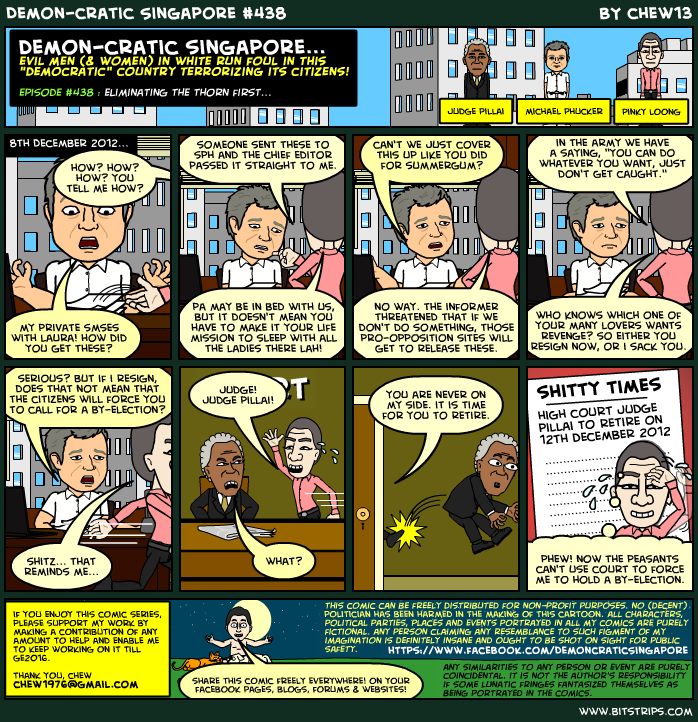
The story is a little different in Malaysia though. Says.com has compiled a list of people who have been arrested for sedition in Malaysia in 2014. The number adds up to 16 people. As for charges, another source states that 40 people have been charged with sedition since 2010.
Surprisingly though, even with the huge number of sedition charges in Malaysia, we could only find a handful of people who were actually convicted of their charges (this was all we could find, do let us know if we missed anyone).
And now for the third criteria…
3. How much resistance do the Acts face?
We could also consider how much citizens in both countries have spoken up against it. Opposition towards the Sedition Act in Malaysia is high with plenty of people and groups speaking out and criticising it, both in and out of the country.
But on the other hand, it seems to be the opposite in Singapore. To be honest, we could find almost nothing on Singaporeans protesting or asking for the Sedition Act to be repealed. All we could find was this quote by a former Chief Justice of Malaysia.
“Singapore still has the Sedition Act. Singapore does not hesitate to take legal action against people who commit sedition, yet no one criticises them.” – Former Chief Justice Tun Abdul Hamid Mohamad, as quoted by themalaysianinsider.com
Aiyoh! So which one is worse???
Well, based purely on the things that we’ve written above, it seems that Singapore has less of an issue with their Sedition Act than we do. Yes, this frustrating comparison is inconclusive, but wait…
Here’s something we realised along the way of writing. This is the question. Is Singapore really better off in terms of what they can or cannot say? And we have to say that merely comparing Sedition Acts is not enough to answer that.
1. Malaysia is a whole lot bigger than Singapore in terms of population – (30 million versus 5 point something million). This would mean that by virtue of number, we would very likely have more cases of sedition than Singapore would.
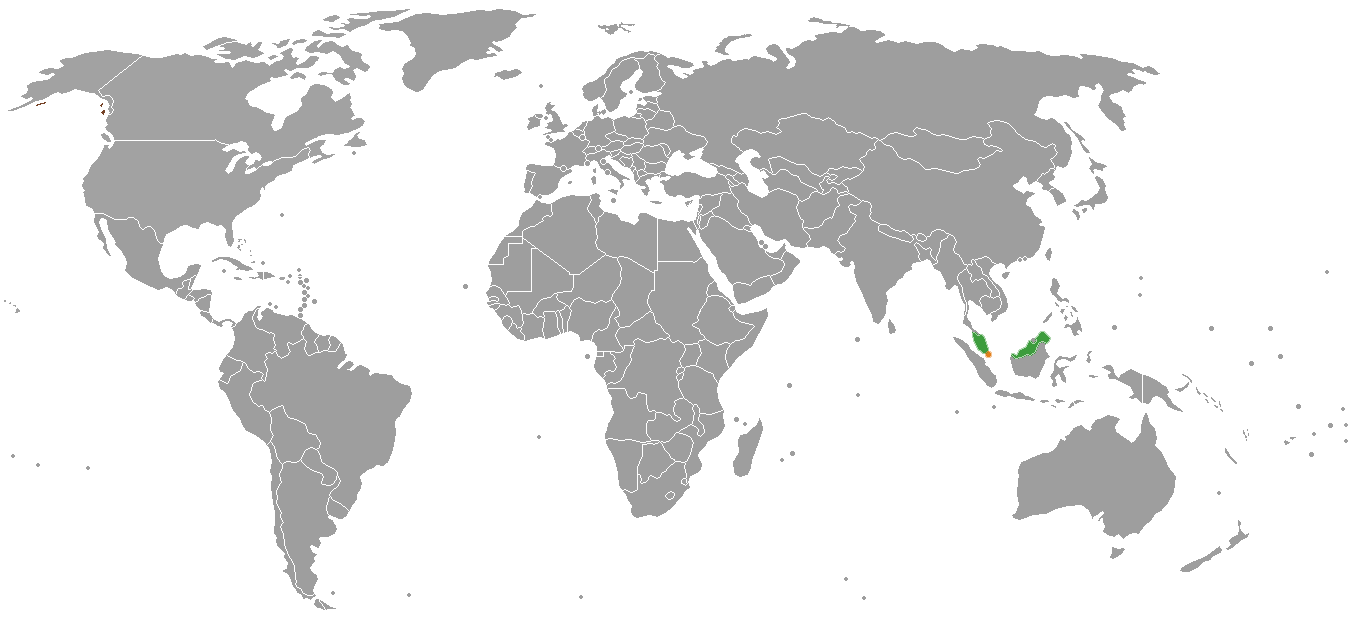
2. Singapore uses the Defamation Act alot also – (something that Random Singaporean also mentioned). Why? Because apparently, the use of this Act by the government is a big thing is Singapore.
TRS (the website mentioned earlier) lists down quite a number of defamation suits by the government of Singapore against various people, many of them opposition members. This article then goes on to say that the use of civil defamation suits has pretty much scared Singaporeans from saying things that disagreed with the government.

We spoke to a Singaporean blogger and activist, Roy Ngerng (who himself was sued for defamation by the gomen of Singapore), to hear his opinions on this. He mentions that besides the sedition act, other lawsuits involving different charges and Acts had been used by the Singapore gomen to restrict freedom of speech.
“Singaporeans are generally aghast at the use of such laws and intimidation tactics against ordinary Singaporeans. You can see the anger online, via Facebook etc. However, the lack of a strong response is due to the fear that still exists among Singaporeans.” – Roy Ngerng
But to explain these acts and how they’ve been used would probably take a whole new article so here are just some cases for you if you’re interested.
1. Contempt of court charges – A blogger and gay rights activist, A cartoonist (same as the one mentioned earlier)
2. Harassment charges – An inventor and the people behind a Singaporean political website
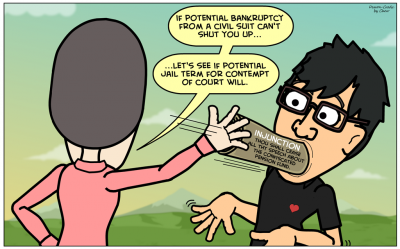
Sounds familiar, doesn’t it?
Then why are so many Malaysians fighting the Sedition Act??
Cos we want to have more freedom of speech than Singapore mah. No, bad joke. Joking only k don’t marah.
But in all seriousness, why don’t we take a look at this open letter by Amnesty International to Najib? In the letter, Amnesty International requests that the Sedition Act be abolished based on 3 points:
1. It criminalises freedom of expression
2. Its investigations foster a climate of fear
3. It’s very vague, thus restricting the human right to freedom of speech
They also go on to suggest that the act be repealed, people held under the act be released and review other laws that may hinder the right to freedom of expression.
But their message is clear, isn’t it? They are fighting for more than just the abolition of the Sedition Act… They are championing the freedom of speech. Pretty much like all these other fellas as well.

At the end of the day, all this talk about the Sedition Act isn’t so much about the act itself… It is about freedom. Taking away an Act may very well be futile if there are people in power who will misuse other laws. As Roy Ngerng would say about the condition of Singapore:
“The Singapore government has never stopped using the law or its devices to prosecute Singaporeans. Such human rights transgressions and abuses have been ongoing for the past more than 50 years. What has changed is the way these devices are used but not their intensity.” – Roy Ngerng
Because really, if we’ve learned anything about Singapore and Malaysia from this article, it’s that laws don’t prevent the freedom of speech – people prevent the freedom of speech.
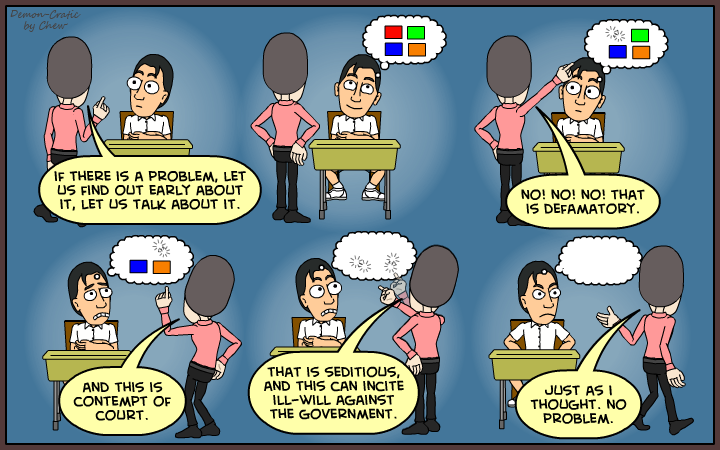
- 292Shares
- Facebook290
- Email1
- WhatsApp1

